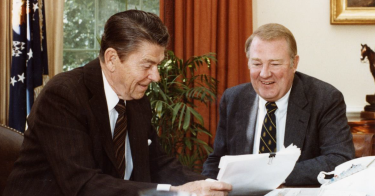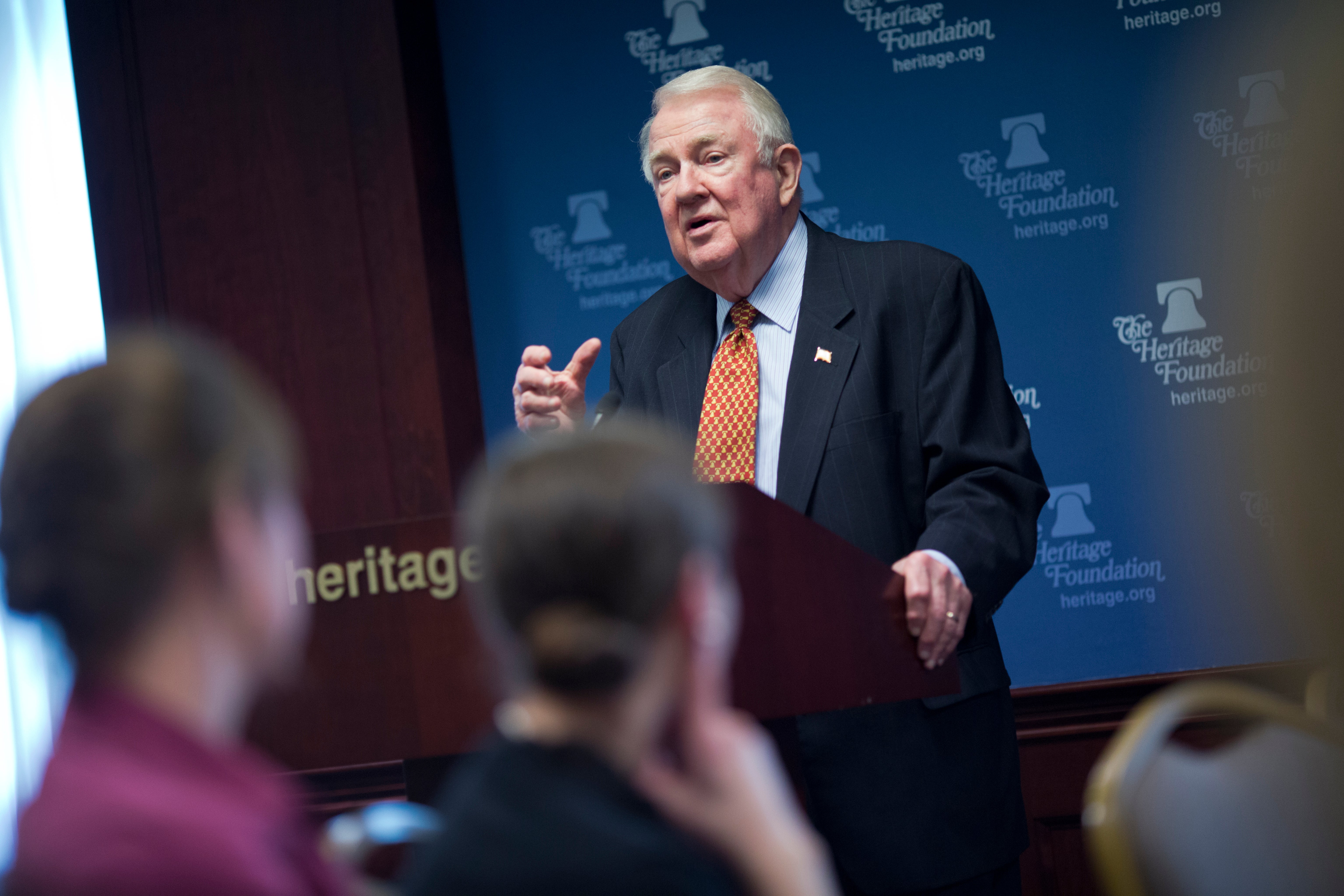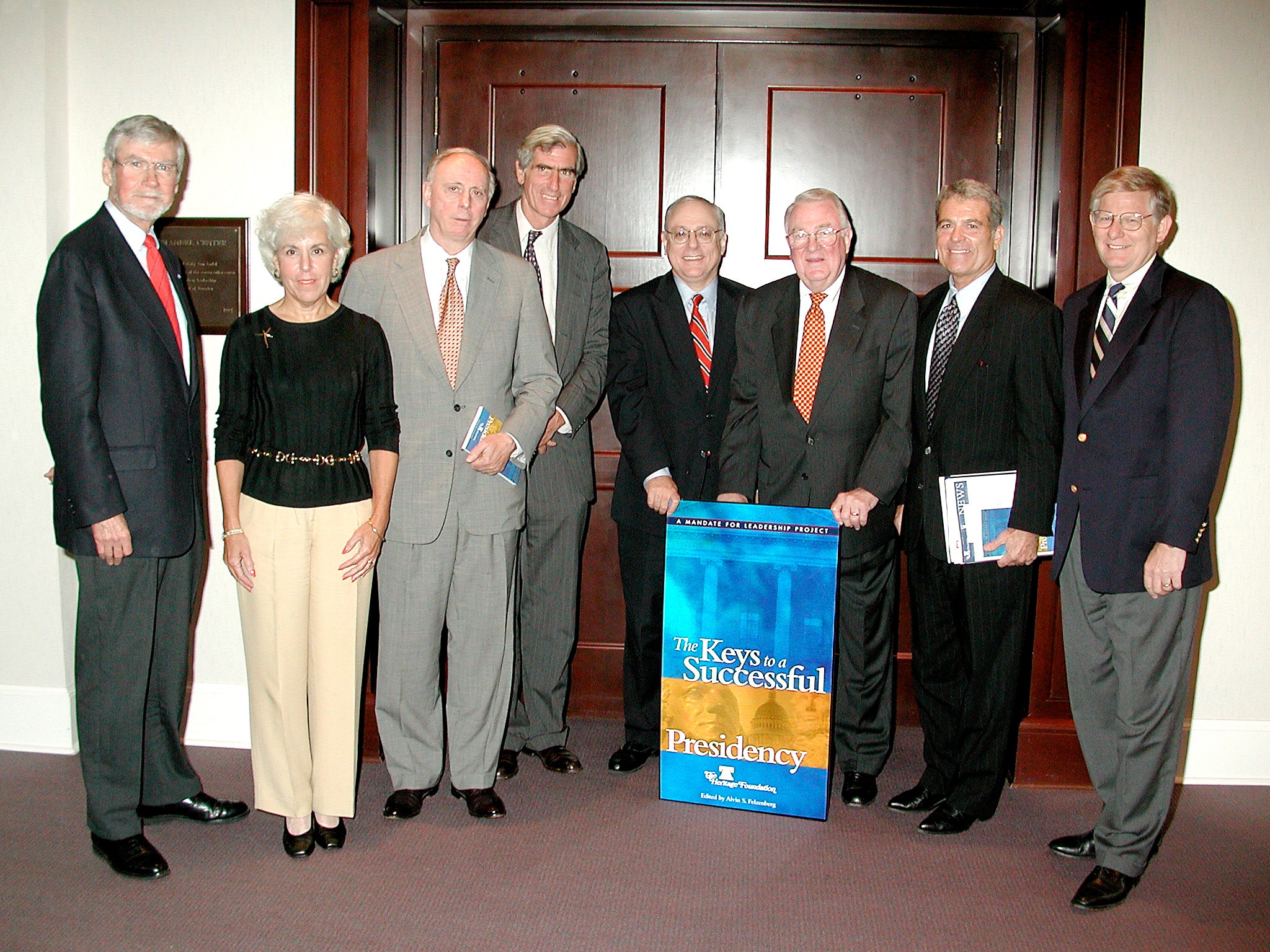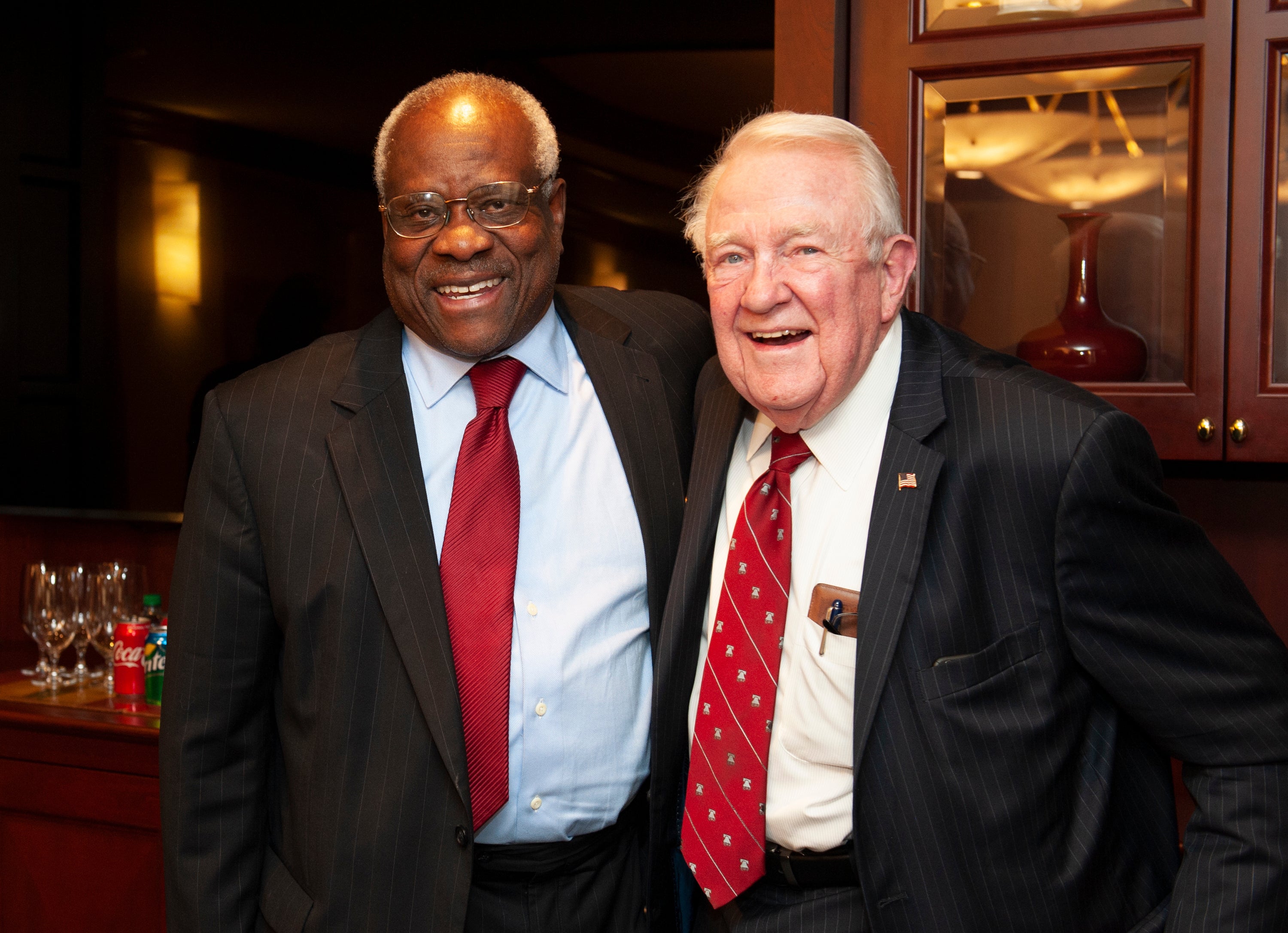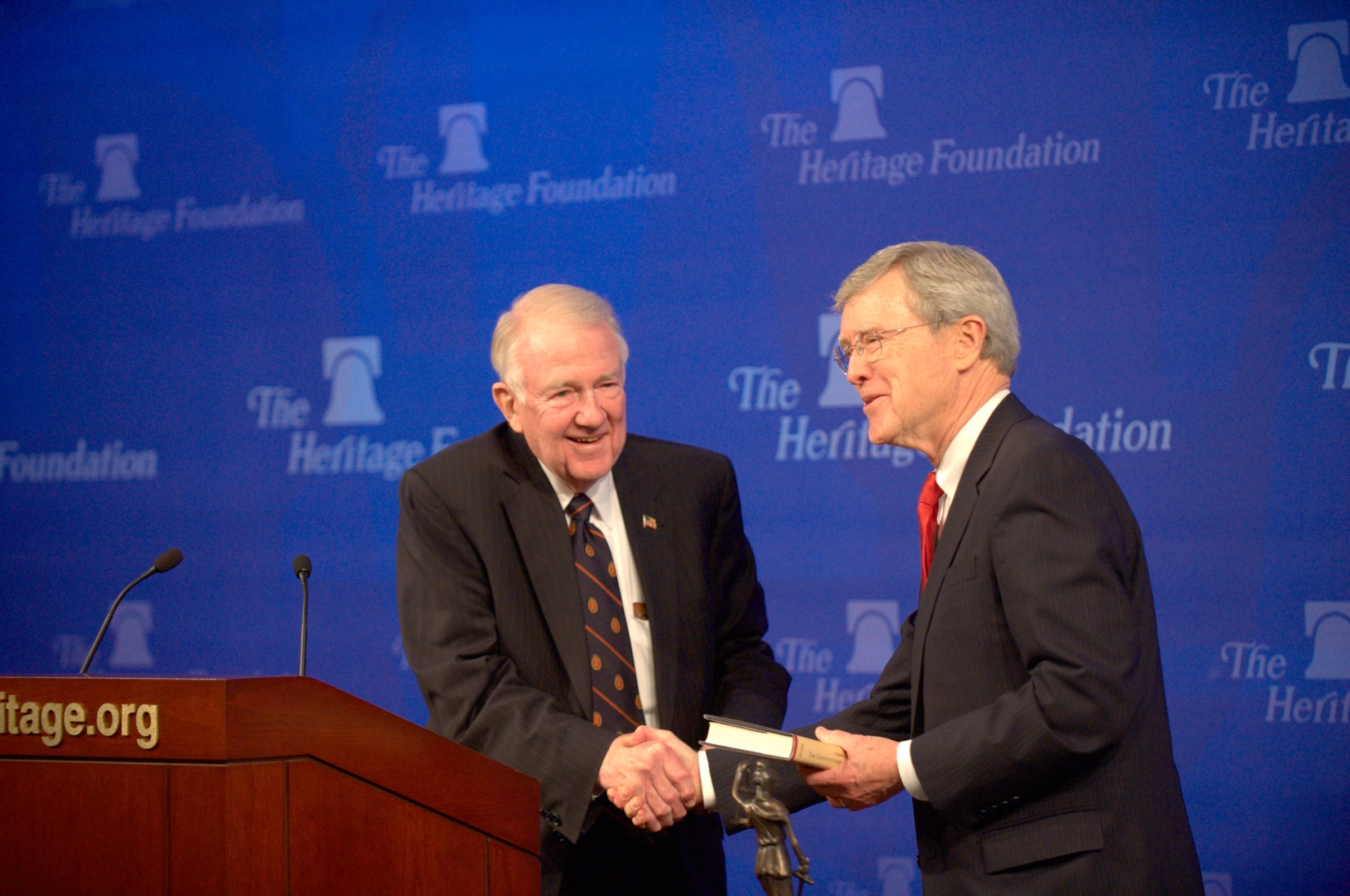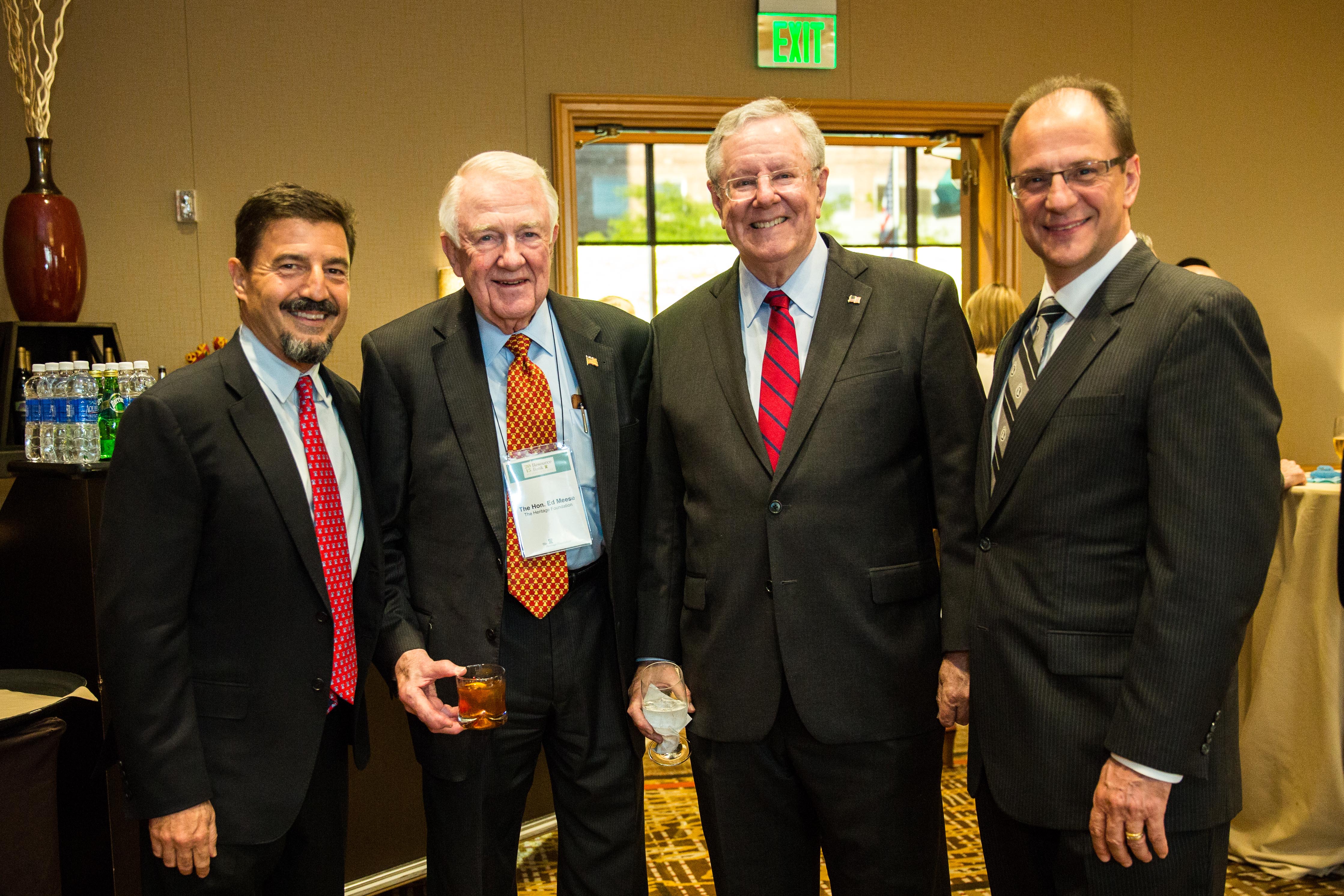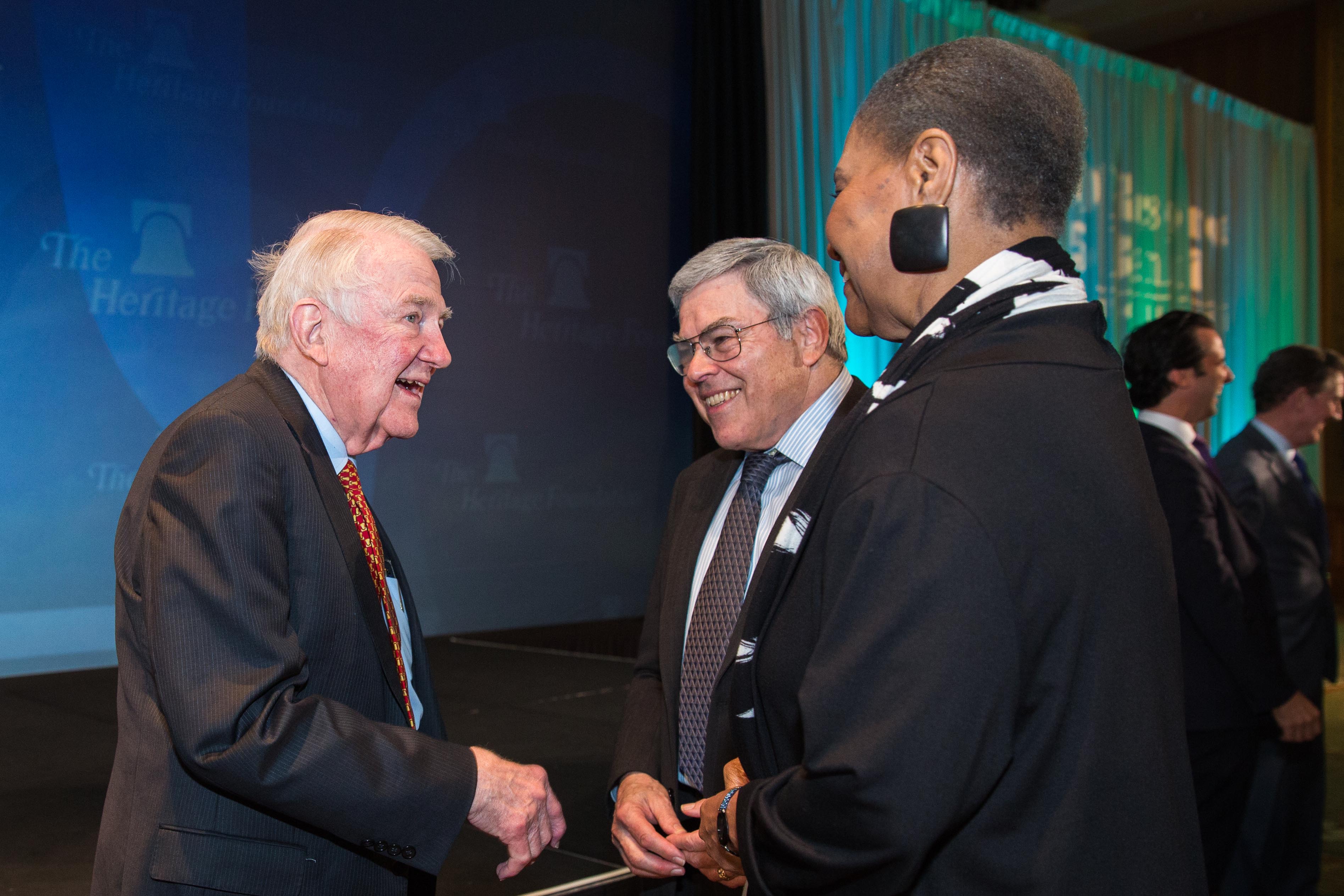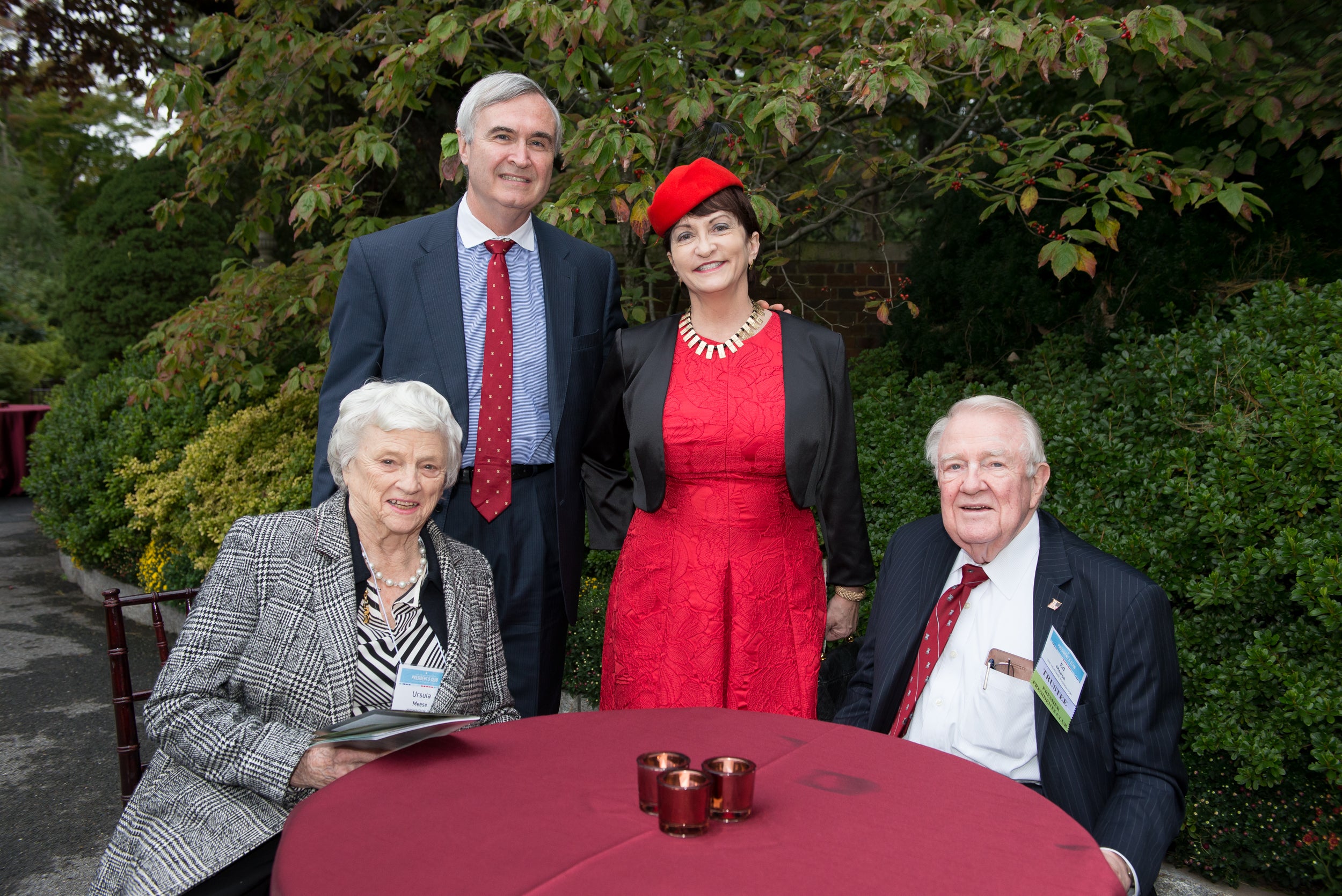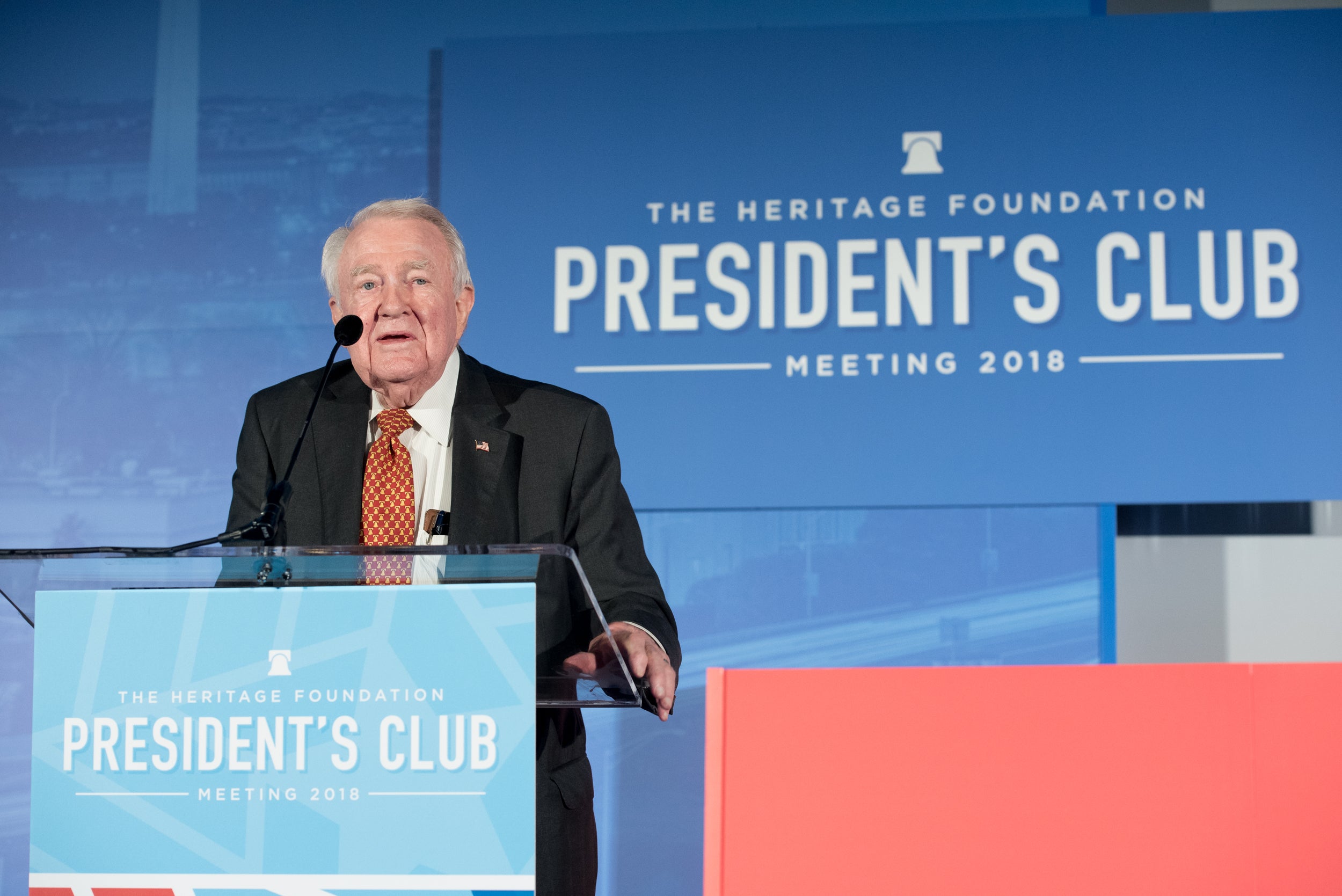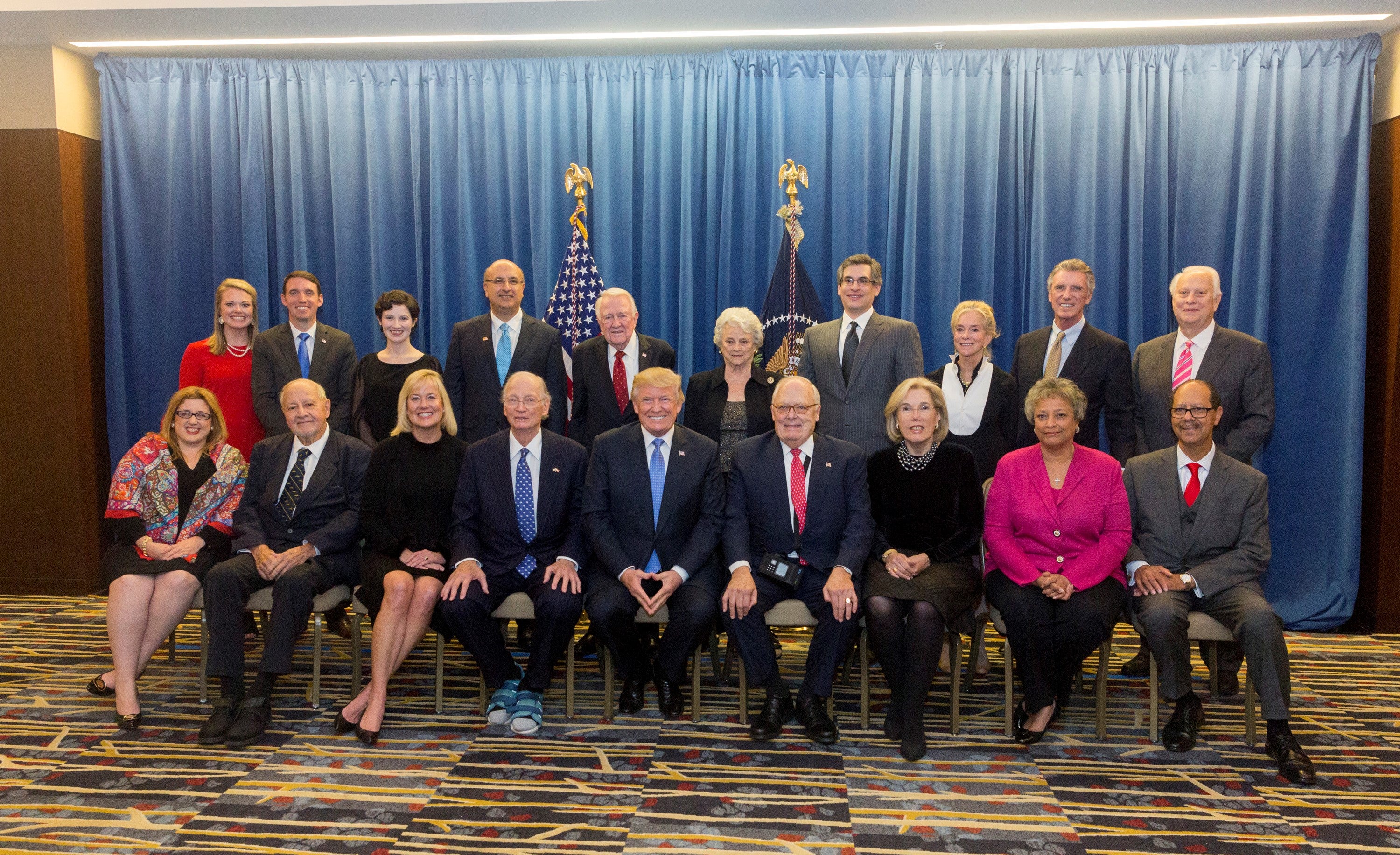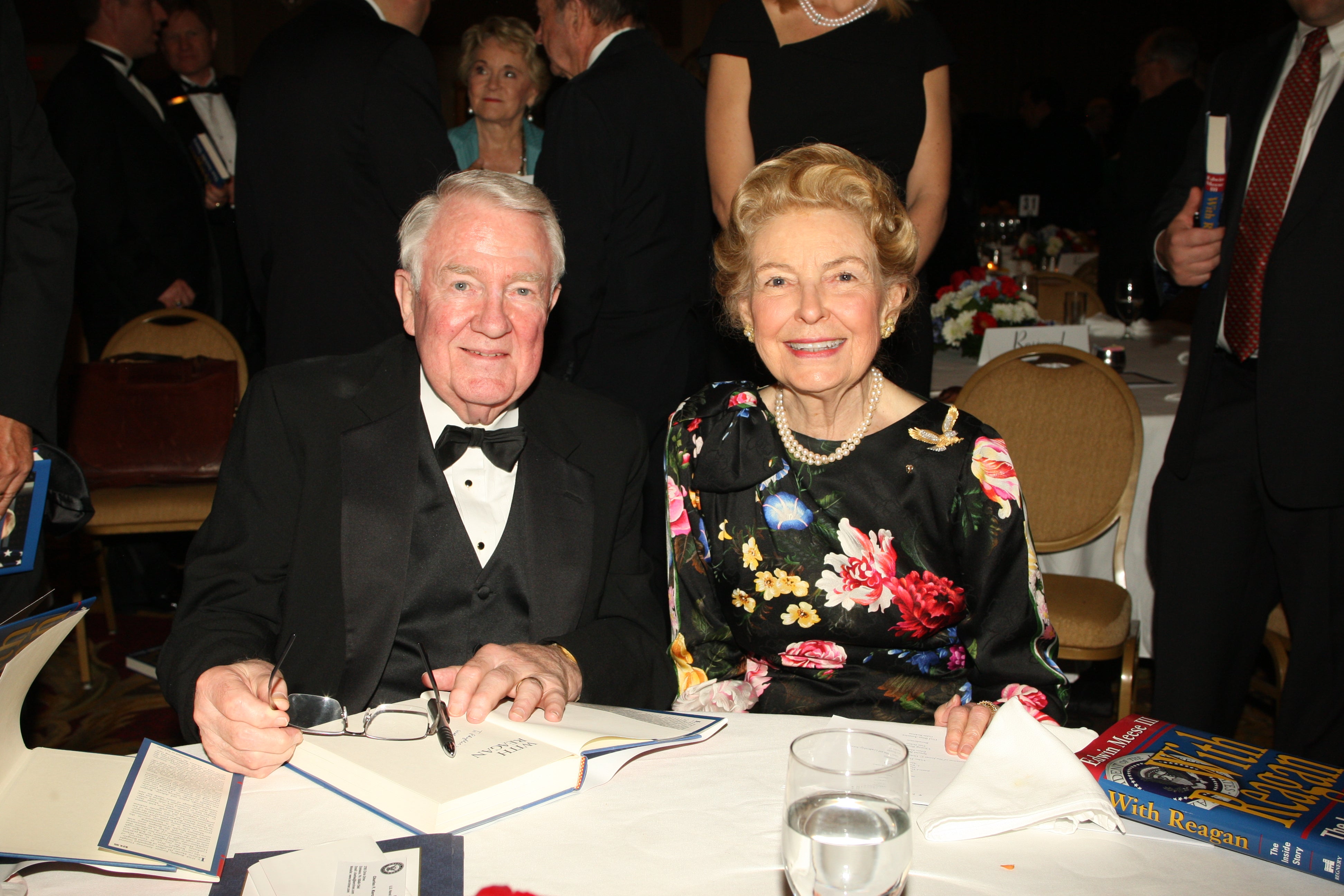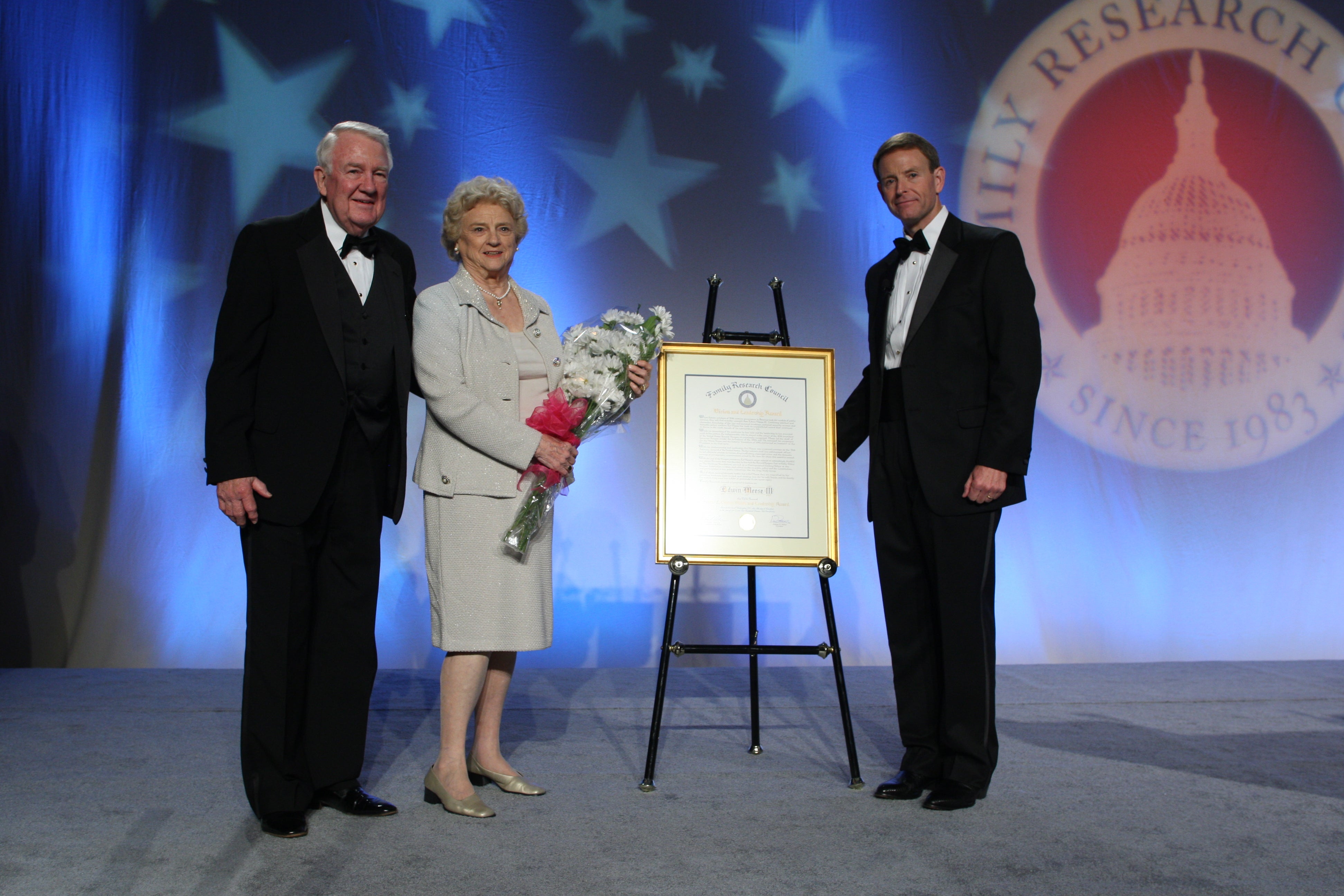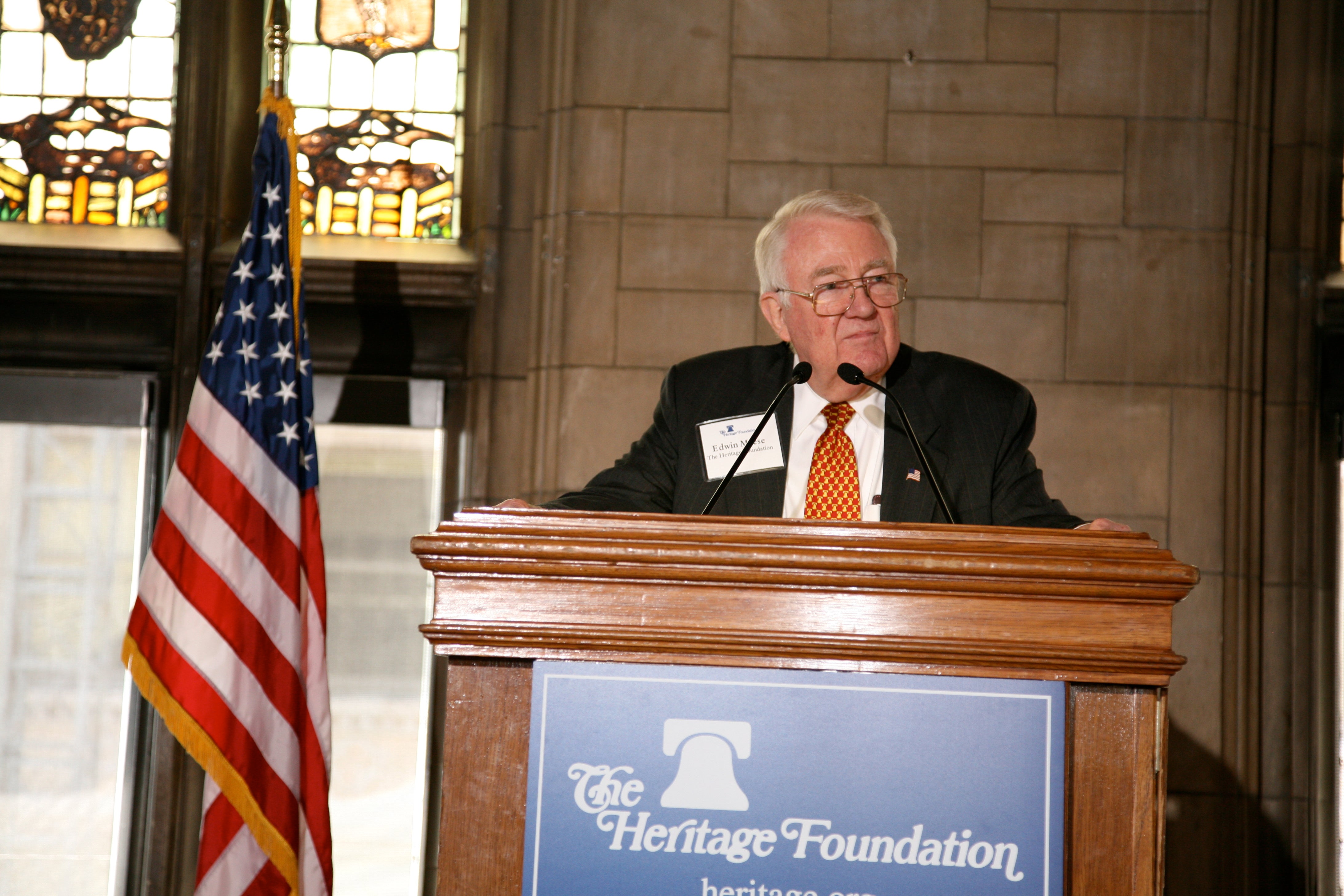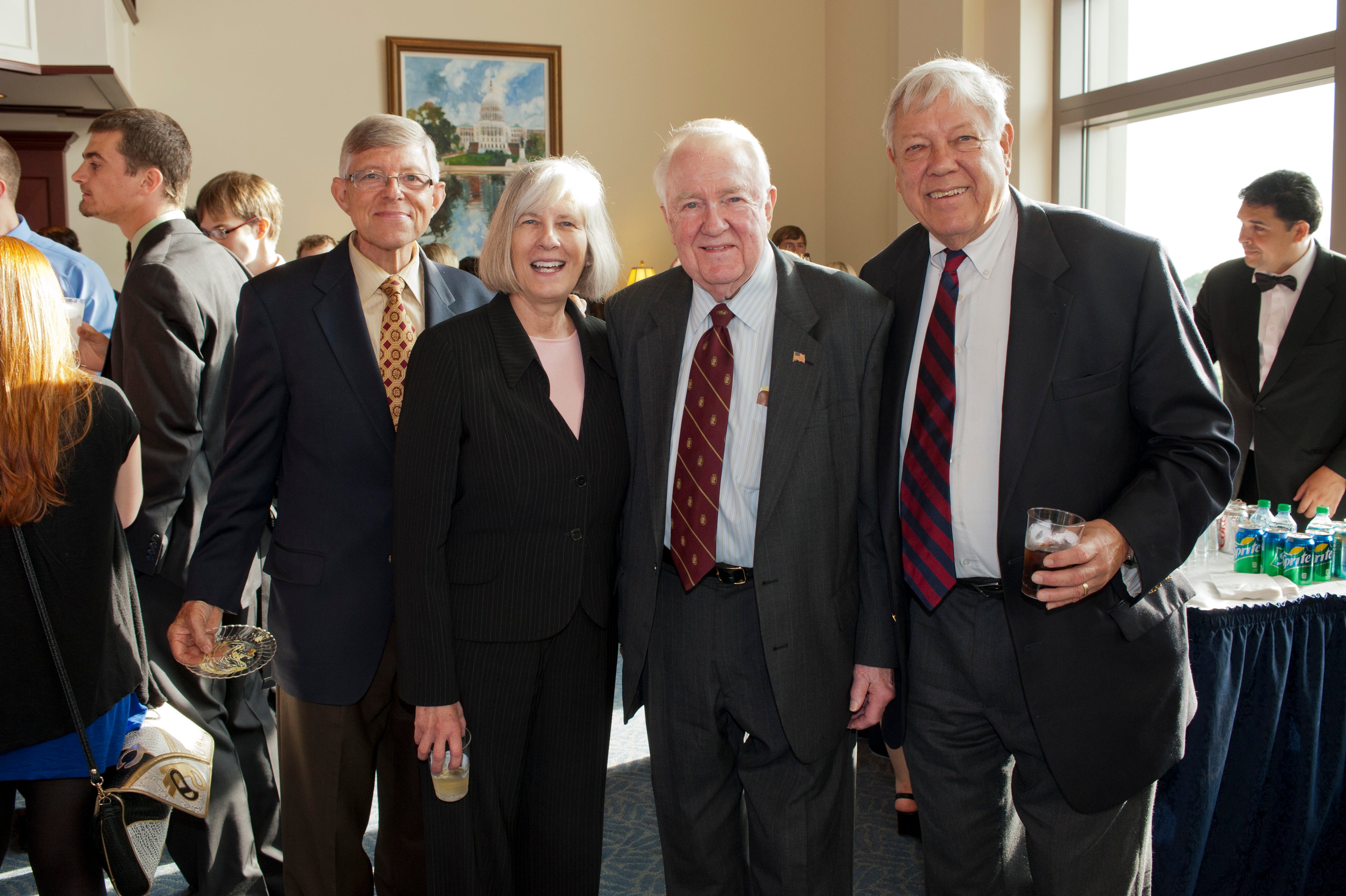CONSERVATIVE LEADER, THINKER, AND ELDER STATESMAN
Edmund Burke could have been describing Ed Meese when he said “a disposition to preserve, and an ability to improve, taken together, would be my standard of a statesman.” Those who have had the privilege to work with Ed Meese during his lifetime of public service can all agree that his achievements reveal a commitment to the realization of principles that transcend the politics of any period.
In a town often dubbed “the swamp” for its power brokers and unmatched egos, Ed Meese has distinguished himself as a man of immense integrity and unparalleled humility. In his 86 years, he has lived the life of an authentic public servant and become the living embodiment of the Reagan Revolution. Acknowledging Meese’s genuine kindness and humbleness of heart, Ronald Reagan once said, “If Ed Meese is not a good man, there are no good men.”
Ed Meese’s contributions to constitutional law, criminal justice, and public policy have left an incomparable legacy in a career spanning six decades. Even today, he is hard at work defending constitutionalism and the conservative principles we all hold dear: free enterprise, limited government, individual freedom, traditional American values, and a strong national defense.
We should all be eternally grateful for his unwavering, lifelong commitment to the sanctity of the rule of law and proper limits on government power. Ed Meese is an American treasure that deserves the highest honor and recognition for his accomplishments, hard work, and dedication to our great Republic.
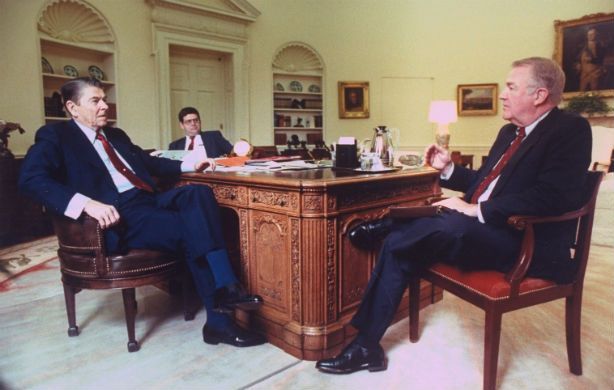
REAGAN REVOLUTION
From the halls of California’s State Capitol in Sacramento to the Oval Office in the White House, Meese was Ronald Reagan’s most trusted aide. At each step of Reagan’s rise to the presidency, Meese was at his side. A young prosecutor when Governor Reagan tapped him to join his new administration, Meese quickly gained the respect of his boss and became known as the “assistant governor.” Meese advised Reagan through two presidential campaigns and then managed the smoothest presidential transition in history.
He was a central figure of the famous “troika” that guided the White House in President Reagan’s first term. As Counsellor to the President, he functioned as the president’s chief policy adviser and had management responsibility for the administration of the cabinet, policy development, and planning and evaluation. During the time he held both these positions, Meese was a member of the president’s cabinet and the National Security Council. He coordinated many of Reagan’s most important proposals, including judicial selection and the Strategic Defense Initiative.
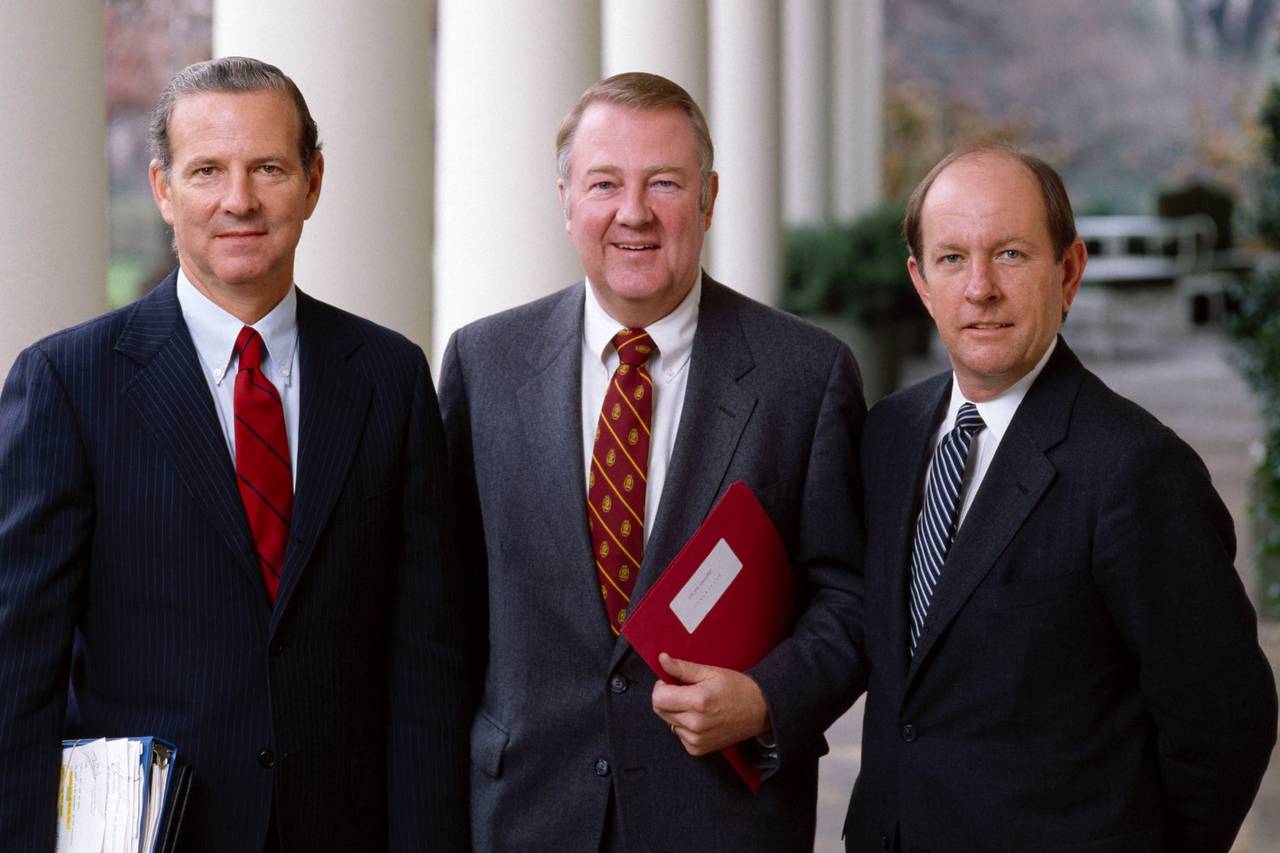
“No one could synthesize policy for the president as Ed did,” remarked James A. Baker, chief of staff for President Reagan in his first term. “He was superb.” “Reagan valued Ed’s mind,” said Michael K. Deaver, “his ability to sum up and recommend.” Meese was instrumental in Reagan’s success at lowering taxes, stimulating economic growth, winning the Cold War, and restoring America’s confidence after years of poor leadership by several presidents.
When Reagan nominated Meese as Attorney General he stated that “Ed is not only my trusted Counselor, he is also a person whose life and experience reflect a profound commitment to the law and a consistent dedication to the improvement of our justice system.” This commitment was demonstrated by the goals he outlined during his swearing-in in 1985: “First, the protection of the law abiding from the lawless with due and careful deference to the Constitutional rights of all citizens; secondly, the safeguarding of individual privacy from improper governmental intrusion; third, the vigilant and energetic defense of the civil rights of all Americans; and fourth, the promotion of legal regulatory structures designed to conserve and expand economic freedom.”
During his tenure at the helm of the Department of Justice, Meese was a leader in the war on drugs, international efforts to combat terrorism, drug trafficking and organized crime, and a crucial voice of conscience when the Administration confronted the Iran-Contra affair.
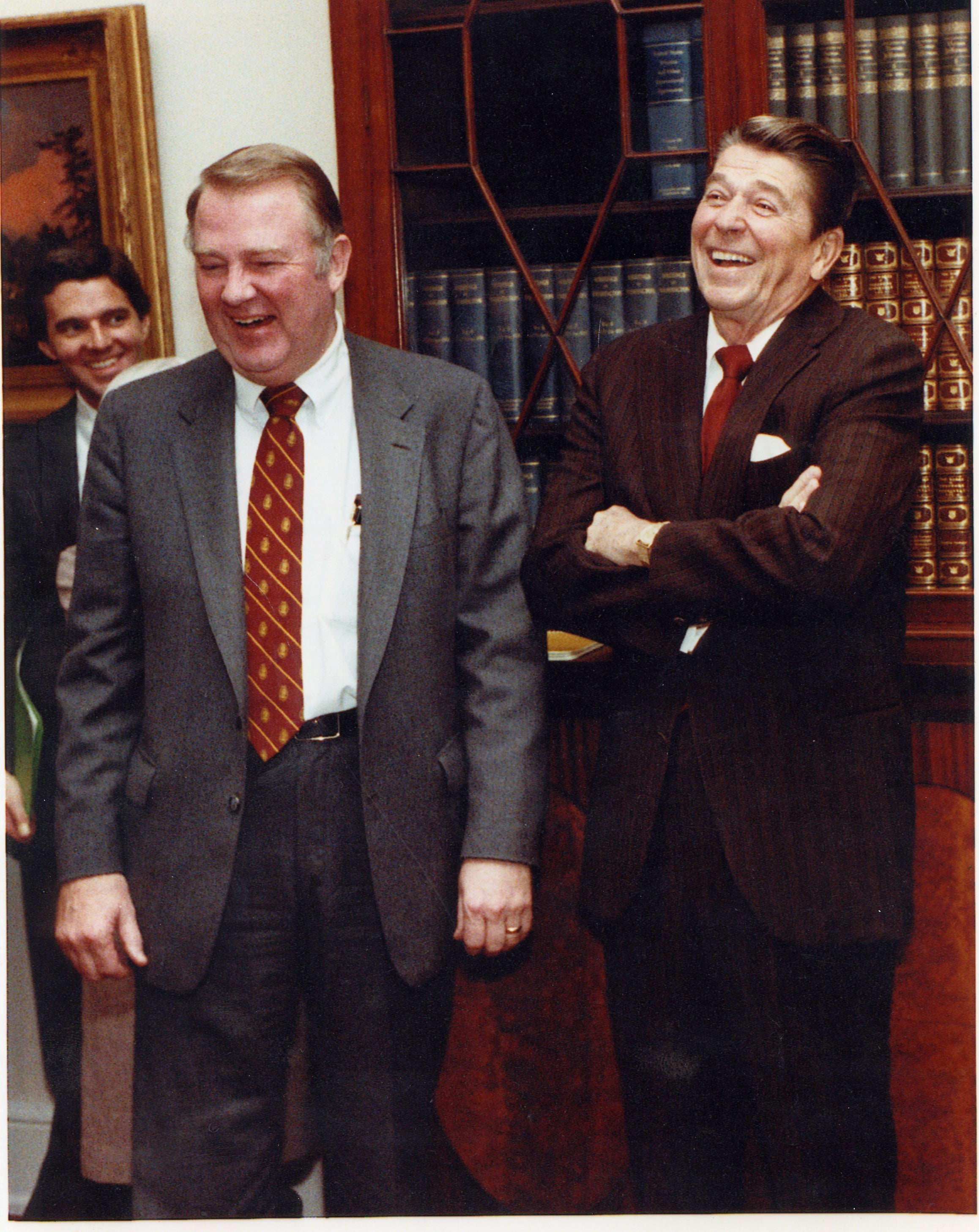
FOUNDING FATHER OF ORIGINALISM
It was three decades ago, when then-Attorney General Ed Meese initiated an important spirited national debate about the proper application of our most important governing document—the U.S. Constitution. His goal was to persuade judges, even Supreme Court justices, to agree they should respect the text of the Constitution and the intent of the Founders who wrote it.
In a July 1985 speech to the American Bar Association, Meese declared that the Supreme Court had engaged in too much policymaking in its latest term and showed too little “deference to what the Constitution—its text and intonation—may demand.”
It is fair to conclude, he said, that far too many of the Court’s opinions were “more policy choices than articulations of long-term constitutional principles.” Instead, Meese said, the high Court should employ a “Jurisprudence of Original Intention”—a return to the intent of the authors of the Constitution and the Bill of Rights.
With that speech and two others that followed, Meese was the first attorney general since Robert Jackson (under President Franklin D. Roosevelt) to question how the Constitution ought to be interpreted and to recognize there is a role for the executive branch in “shaping the form of jurisprudence.”
The reactions of the proponents of an ever evolving “living constitution” ranged from the incredulous to the furious. They protested that the Meese Justice Department was engaging in a “badly disguised attempt” to limit the constitutional rights of minorities. They hailed Supreme Court Associate Justice William J. Brennan Jr. when he described the constitutional views endorsed by Meese as “little more than arrogance cloaked as humility.” Defending his judicial activism, Brennan stressed the need to adapt the Constitution “to cope with current problems and current needs.”
Meese calmly responded that he welcomed Brennan to the widening legal debate about the Constitution. “There is a sense that a sea change is upon us,” commented A. E. Dick Howard, a professor of law at the University of Virginia, and “Mr. Meese is willing to lead the charge.”
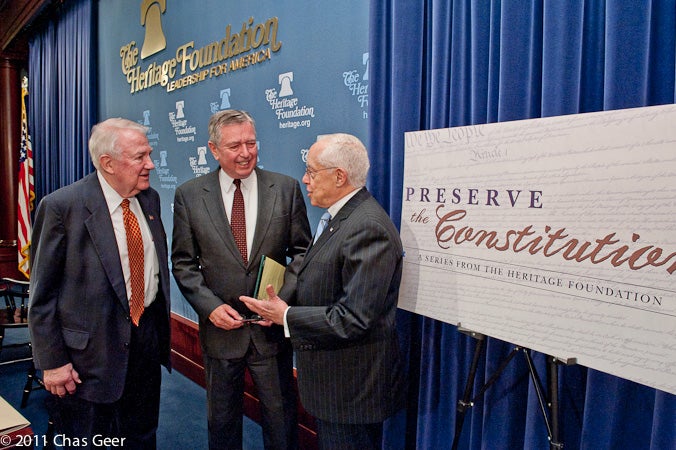
Indeed he was. Meese reiterated the theme of “original intention” in speeches before the Federalist Society and Tulane University, saying that interpreting the Constitution’s “spirit” instead of its words invited the danger of “seeing the Constitution as an empty vessel into which each generation may pour its passion and prejudice.” He charged that the current judicial activism was not faithful to the written Constitution.
He argued that a Supreme Court decision “does not establish ‘a supreme law of the land’ that is binding on all persons and parts of the government, henceforth and forever more.” Meese stood on firm ground. Abraham Lincoln had led a great war to overturn the Court’s decision in Dred Scott, which said Congress could not stop slavery in the territories.
“An activist jurisprudence, one which anchors the Constitution only in the consciences of jurists,” he added, “is a chameleon jurisprudence, changing color and form in each era.” A true approach, he said, “must respect the Constitution in all its parts and be faithful to the Constitution in its entirety.”
Meese was not a revolutionary but an apostle of ordered liberty—the prudential blending of individual liberty and political order under the Constitution and through a jurisprudence of Original Intention. The “Great Debate” that he started three decades ago placed the idea of judicial originalism at the center of American jurisprudence. It fundamentally altered the constitutional landscape of this nation. Let us now praise the man who initiated that debate and helped preserve and protect our liberties and those of generations to come.
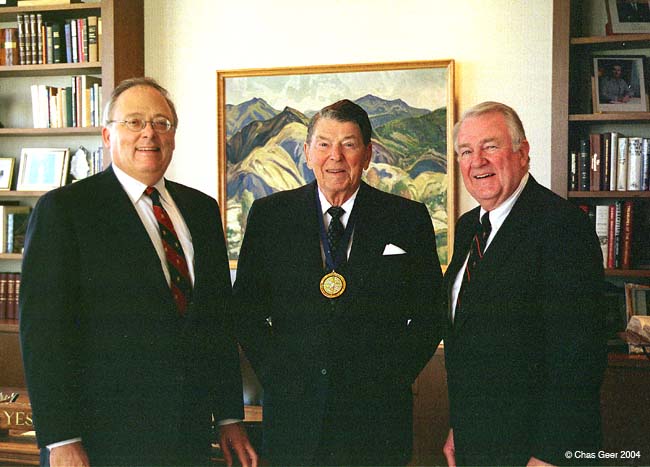
THE RISE OF THE CONSERVATIVE LEGAL MOVEMENT
In addition to working to select constitutionalist judges during the Reagan Administration and advancing a jurisprudence of originalism, Meese was also a key founder of the freedom-based public interest legal movement. Starting 45 years ago, the freedom-based public-interest law movement set out to restore the original meaning of the Constitution, oppose judicial activism, and challenge the radical agenda of liberal litigators.
Dedicated young lawyers, many mentored by Meese, took up the cudgels against an array of well-financed, well-organized attorneys. As Meese puts it, these principled and determined organizations “have stopped Goliath again and again.” It is in no small part due to the guidance and leadership from Meese that there have been major legal victories in critical areas such as property rights, school choice, religious freedom, eliminating racial discrimination, freedom of speech, workers’ rights, and economic liberty.
In 1973, Meese helped to form the first freedom-based public interest law firm, the Pacific Legal Foundation. Unlike other public interest firms, it differed because it was formed to defend and enhance individual and economic freedom in our country through litigation supporting free enterprise, private property rights, and limited government. This was a perfectly coordinated outgrowth from many on then-Governor Reagan’s legal team. Meese and others saw that early success litigating on behalf of private property rights suggested that its model could—and should—be duplicated in other regions of the country.
Because of the vision of Ed Meese, these freedom lawyers, these modern-day Sons of Liberty, continue to grow and flourish across the country. They are guided by the principles of the U.S. Constitution, as originally construed, and are dedicated to preserving the political miracle that occurred in 1787 in Philadelphia -- the creation of a government of laws and not of men.
PRAISE FOR THE PERFECT PUBLIC SERVANT
President Ronald Reagan
“Ed is not only my trusted Counsellor, he is also a person whose life and experience reflect a profound commitment to the law and a consistent dedication to the improvement of our justice system.”
Justice Samuel Alito
“General Meese began the process of refining and developing Originalist theory in the public eye. This has not only improved legal scholarship and public discourse; it continues to have a profound effect on judicial decisions.”
Justice Clarence Thomas
“I met General Meese in December 1980, and I consider it a distinct honor to have served with you in the Reagan Administration and to have known you now for over 35 years. . . I remember when you were being criticized heavily, and that’s an understatement, in the city. Your demeanor—your pleasant demeanor—never changed. Your positive attitude, your willingness to talk to young people and to persuade them to your ideas, but not returning fire with fire. That is much to commend and much to admire, so thank you, Ed, not only for the years together, but for your example.”
President Donald Trump
“For nearly half a century, [The Heritage Foundation] have been titans in the fight to defend, promote, and preserve our great American heritage. Few people have worked harder to protect this heritage than Ed Meese, a fearless defender of our Constitution.”
Bill Bratton, Former NYC and Los Angeles Police Commissioner
“The General and I do go back a long way. We first met at the Harvard Kennedy School Executive Sessions on Policing in the late 1980s, early ’90s. I was Superintendent of the Metropolitan Police in Boston at that time, a state police agency, and the executive sessions, more so than just about any other government activity that I’m aware of over the last 50 years, shaped American policing and shaped it for the better. We are still a profession that is developing, evolving continually, but a major revolution was created during those sessions.
Not widely known was the General’s role in that. Through the National Institute of Justice, Chips Stewart, it was funded, and a Republican Administration, funding an executive session at one of the most liberal universities in the United States, created what effectively was community policing. Community policing that oftentimes was largely associated with Democratic Administrations in the ’90s was effectively created by active participation of the Reagan Administration in the person of the Attorney General, who attended, despite his incredibly busy schedule, every session over many years. I am an extraordinary admirer of his. It is an unheralded accomplishment on his part.
I welcome the opportunity today to remind people just how instrumental he was personally in his capacity as Attorney General in helping to point American policing in a very defining way at a very difficult time in the history of our country.”
Mark Levin, Syndicated Talk-Radio Host and former Chief of Staff to General Meese
“I have never been so honored to know another man as well and to have been as blessed to know Ed Meese. He is a model citizen and statesmen to all of us. His decency, morality, kindness, generosity, and humility are known by all who have spent time with him, whether they be Presidents and Prime Ministers, or interns and janitors. He is the same principled man in private as he is in public. And under pressure or in easier times I’ve seen it up close, not just as his former chief of staff, but as his friend. When others would panic under the most vicious political and media attacks imaginable, Ed would remain strong and steadfast, demonstrating by actions and words his commitment towards what was right and proper. When others wanted to take the easy course in this city and abandon President Reagan’s legal and judicial agenda, Ed Meese refused. And where others were disloyal and self-aggrandizing, Ed was loyal and selfless . . . For conservatives in the Reagan administration and across the nation, Ronald Reagan was our commander in chief and Ed Meese was and remains our General.”
Ed Feulner, Founder and former President, The Heritage Foundation
“Our city, Washington, this center of power for the world, desperately needs more people like Ed Meese. The town is brimming over with men and women who strive for their own power for the sake of themselves. But even Ed Meese’s enemies (whose public pronouncements show they know next to nothing about the kind of man Ed really is) are forced to admit that whatever their disagreements with him, he seems to be utterly devoid of personal ambition.
Who among Washington’s power brokers has had more chances than Ed Meese to step into the limelight and grab something for himself? Instead, for all the years I’ve known him, Edwin Meese III has been about one thing: doing what he sees as the next right thing for America.
For years, that was serving Ronald Reagan in whatever capacity the Great Man needed him. Today it is serving as The Heritage Foundation’s leading expert on a host of issues, including what should be done to bring our legal system back into line with limited government as set forth in the U.S. Constitution. The key word, in case you missed it (as his political enemies consistently do), is “serving.”
Judge William Pryor, United States Circuit Judge of the United States Court of Appeals for the Eleventh Circuit
“General Meese’s visit to Tulane, where I was a third-year law student, was a formative experience for me for two reasons. The first reason pertains to the public purpose of his address: that is, his intent to ignite a national conversation about first principles and the Constitution. The second reason pertains to a little-known but nevertheless important part of General Meese’s visit: his attendance as the guest of honor at a reception hosted by a then-new student group at the law school. Both matters are testaments to the vision and legacy of Edwin Meese, for which our beloved country owes him a debt of gratitude.”
“My remembrance of the Tulane speech is a fond recollection of a prescient leader. General Meese added to his public contributions to the great debate on originalism, and he quietly supported and inspired the next generation of leaders in law. Many others can tell similar stories about General Meese. That night, I was fortunate to become his friend. In later years, he always remembered me and our brief partnership at Tulane and, in critical moments, assisted me in my career of public service. Thank you, General Meese, for the help you provided me, but more importantly for your service to our country.”
Judge Janice Rogers Brown, former United States Circuit Judge of the United States Court of Appeals for the District of Columbia Circuit.
“I especially want to express my gratitude to Ed Meese for his friendship, for his many kindnesses, and for being such a mensch. For those of you who do not speak Yiddish, it means a man of integrity and honor. But for General Meese’s courage and integrity, conversations like this one would be pointless. We are all indebted beyond anything we could repay because he took seriously his oath to support and defend the Constitution.”
Judge Diarmuid F. O’Scannlain, Senior United States Circuit Judge of the United States Court of Appeals for the Ninth Circuit
“For those of us who believe that judges are required to enforce the original meaning of the Constitution, General Meese is a real hero. Not only was Ed instrumental in the appointment of judges who value the original meaning of the Constitution, but he also made the case for this interpretive approach in high-profile speeches during his time as Attorney General. Those speeches had a tremendous impact on legal culture, and it is fair to say that without Ed Meese, the effort to restore the original meaning of the Constitution would not have been nearly as successful as it has been. For that, all of us owe Ed our gratitude.”
Senator Ted Cruz
“Congratulations to Attorney General Ed Meese on being awarded the Presidential Medal of Freedom,” said Sen. Cruz. “General Meese has devoted his life to advancing conservative values that have improved the lives of millions of Americans and helped chart the course of the conservative movement. From working with President Reagan in both the California Governor’s Mansion and the White House, to serving the United States as Attorney General, to promoting the principles our democracy was built on through his work at the Heritage Foundation over the last thirty years, General Meese has had a profound, good, and lasting influence on American domestic and foreign policy, and is a very worthy recipient of this esteemed award.”
Senator Mike Lee
“Ed Meese has long been a hero of mine—starting from my childhood when he was my dad’s boss at the Department of Justice, and through my service in the Senate, when he has remained a consistent, reliable voice in defense of good government and the Constitution.”
CEI President Kent Lassman
“General Meese demonstrates that the life of the mind is available to those who engage in the everyday tussle of politics. He is a leader and exemplar for those of us who seek to marry a constrained vision of the state with deep respect for the law. Congratulations to Ed on a lifetime of service to our nation.”
David McIntosh, President of Club for Growth, former Indiana Congressman, former special assistant to Attorney General Edwin Meese III
“Edwin Meese is a principled, Constitutional conservative, and I am proud to call him a friend and mentor. He served Ronald Reagan with distinction from when he was Governor of California and throughout his Presidency, and he continues to serve the conservative movement with his academic work and activism. Few have done more to advance the principles of limited government than Edwin Meese, and I’m honored to congratulate him on receiving the Medal of Freedom.”
Matt Schlapp, Chairman, American Conservative Union (ACU)
“On a personal level, Ed has always been gracious and encouraging to me in my ACU role. His most lasting legacy is his defense of the Constitution but his most endearing virtue is his commitment to helping all of us succeed.”
Senator Marco Rubio
“Today, we celebrate Ed Meese and the decades of service he has provided to our country. As a leader and thinker, Ed played an integral role in sparking a renewal of textualism as the appropriate manner by which jurists should interpret our nation's body of law. From his various roles within the Reagan administration to his post-government career at The Heritage Foundation, Ed forcefully advocated that we should interpret the Constitution according to its original intent -- irrespective of whether a decision’s policy result is something that we personally agree with. Ed recognized that some things are bigger than all of us, and he lived that out in his career. Thank you, Ed, and congratulations on this great honor.”
Family Research Council President Tony Perkins
“General Meese is a true servant leader whose example both challenges and inspires. His humility and wisdom has made him a trusted counselor to presidents as well as aspiring young leaders. His unyielding devotion to his country is eclipsed only by his deep faith in God, the abiding love for his wife, Ursula, and their family. General Meese is highly deserving of our nation’s highest civilian honor, the Medal of Freedom. All of us, as Americans, as conservatives, owe him a debt of gratitude that we can never fully repay.”
Alliance Defending Freedom President, CEO, and General Counsel Michael Farris
“Anyone privileged to know Ed Meese can confirm he’s a man marked by remarkable humility, cheerful conviction, and authentic honor. Throughout the years, Ed has protected individuals from improper government intrusions, defended the civil rights of all Americans, and promoted a regulatory structure designed to protect and encourage economic freedom. ADF owes special gratitude to Ed for his gracious and vigorous deference to the text and original intention of our Constitution. While the great debate over the meaning of our Constitution continues, Ed’s bold leadership continues to motivate our work to preserve and protect liberty for future generations.”
Myron Ebell, Director of CEI’s Center for Energy and Environment
“Ed Meese is a national treasure. He has advanced the best interests of the United States effectively, honorably, and courageously in one important job after another. It is worth recalling that Ed came to Washington to organize the Reagan presidential transition and then went on to play a central role as President Reagan’s closest adviser in a long list of important conservative accomplishments. It has been my privilege to know and learn from Ed over many years and a great honor to have served with him on the Trump presidential transition.”
Heritage Foundation President, Kay Coles James
“I’ve known and worked with Attorney General Ed Meese for nearly two decades at The Heritage Foundation and I feel there isn’t a recipient more worthy of this honor. Ed has lived the life of an authentic public servant, routinely putting duty to the country ahead of his own interests. From serving as one of Ronald Reagan’s most trusted advisers and helping to foster the Reagan Revolution to founding The Heritage Foundation’s Center for Legal and Judicial Studies, Ed has shown the American people the kind of successes that can be achieved when conservative principles are put into practice. Ed’s entire career has reflected an unwavering commitment to the Constitution, the rule of law, limited government, free enterprise, and individual liberty. With all that he has accomplished, Ed remains one of the most kind and humble men I have ever known.”
